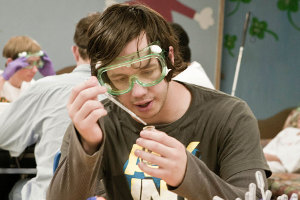[jwplayer config="QUEST Audio Player" skin="http://ww2.kqed.org/quest/wp-content/themes/quest/glow.zip" file="http://www.kqed.org/.stream/anon/radio/quest/2011/05/2011-05-23-quest.mp3" ]
Listen to the QUEST radio story Chemistry By Smell
What Wedler realized is that, with a little help, he could do chemistry. In fact, he’s starting a PhD program in theoretical organic chemistry at U.C. Davis this Fall. But first, he wanted to share what he's learned with other young people who are blind or visually impaired. So he came up with an idea: a chemistry camp for blind kids.
The camp took place in the hills north of Napa, at a 300-acre summer camp called Enchanted Hills, owned by the Lighthouse for the Blind, a San Francisco-based non-profit. About a dozen high school students donned purple plastic gloves and safety goggles to pipette drops of clear liquid into glass tubes. Several of Wedler's classmates from Davis were on hand to help, as well as volunteers from the National Federation of the Blind, which also supported the camp.
The idea was to show that chemistry isn’t just a visual science. That many lab experiments can be done through touch, or smell.
Wedler says blind students will always need help from sighted people to carry out some lab basics, such as handling dangerous chemicals. But ultimately, Wedler tells the class, chemistry is like anything else: it’s something you do with your brain.
"Nobody can see atoms," he says, "you aren’t looking at a nitrogen-nitrogen triple bond. You can’t see that. And honestly most reactions are clear. So there’s no reason you can’t think about chemistry."
There might not be a need for summer camps like this if not for a law passed in 1975 called the Individuals with Disabilities Education Act.
The intentions were good. The act guaranteed disabled kids a place in mainstream public school classrooms, and required districts to provide aides and other resources to help students complete the work.
But in reality, it’s meant that a lot of blind kids don’t get the specialized help they need, especially in science class, says Mary Willows, a teacher, blind since high school, who came to volunteer at the camp.
"This is the first time some of these people have ever touched a test tube or a pipette, or any of that," she said.
When labs take place in regular classrooms, says Willows, blind kids often end up being the note takers, or just sitting the whole thing out.
"Everybody else gets to participate, and you just sit. That erodes confidence. That erodes self esteem. And eventually, you just give up."
This issue of passivity, of giving up, is a very real threat for blind people, a group where unemployment hovers near 70 percent.
For 17-year old Mary Church, who lives in Hollister, this camp was one of the few times in her life she’d spent in a group composed almost entirely of blind people.
"I’m really surprised that they haven’t called me crybaby yet, because I have broken down about school this weekend so many times," she said.
Living in a small town, the only blind kid in her class, Church says school is a constant struggle. Textbooks aren’t available in Braille when she needs them. Teachers routinely give her homework assignments that, as a blind person, she can’t do.
And when people try to help her, sometimes their efforts end up making her feel even more isolated. Like her advanced biology teacher, who, says Church, gives extra credit to the students who work with her.
Says Church, "it makes me feel degraded, because it fees like people are using me to get a better grade in class and I’m just another student trying to learn too."
Chemistry camp isn’t just about chemistry, it’s about pushing through. And, for blind people in a sighted world, it's about learning to pick your battles.
Later that afternoon, I find Church sitting next to Jimmy Cong, a 16 year-old from Santa Rosa. He’s strumming a guitar in the dining hall.
Jimmy says he knows Mary can be pretty sensitive.
"I'm not trying to sound like a jerk," he tells her, "but you just have to deal with it. I don’t know what to say, it’s just hard."
Church agrees. She says she knows she gets put off by things, that she can be too sensitive. But, she says, she’s learning.
"You can’t take all of everything people say to heart," she says, "because sometimes people don’t mean what they say. Unfortunately, it’s just the way the world works."
After lunch, back in the classroom, Kristin Malinkovich, one of Wedler's classmates at Davis, guides the students through a lesson about how acids and bases interact.
"We’ve already added five squirts of the sodium hydroxide. So how many squirts do you think it’s going to take her, before we smell anything?"
Mary Church has been pretty quiet until now. But she figured this out in her head, and she thinks she knows the answer.
"Probably 10," she guesses.
Five squirts later... the unmistakable smell of onion.
She was right.
"Definitely!" Church exclaims. "Ten is the magic number."
Hoby Wedler, the organizer, plans to be a college chemistry professor. Mary Church says she's still trying to figure it out. For now, she’s happy learning about chemistry, hanging out with her new friends, doing the kinds of things teenagers do.

